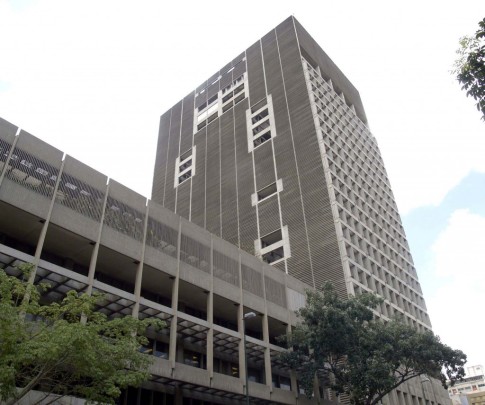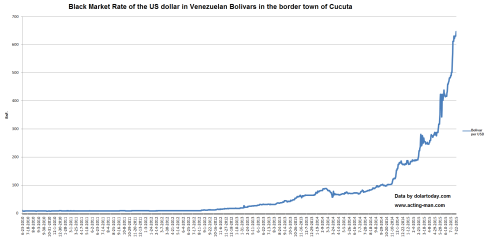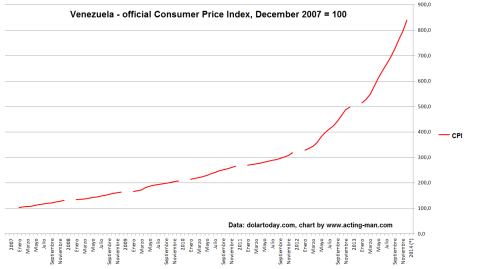– Venezuela’s Hyperinflation Crack-Up Boom On Its Way To Outer Space (Acting Man, July 25, 2015):
Why Stock Markets Are Not an Indicator of the Economy
In a free unhampered market economy based on a sound monetary system – this is to say a market-chosen monetary system with a free banking industry and no central planning institution that is manipulating interest rates and determining the size of the money supply – the gains and losses of shares prices in the stock market will simply be a reflection of entrepreneurial profits achieved in the past, plus embedded expectations of profits likely to be achieved in the future.
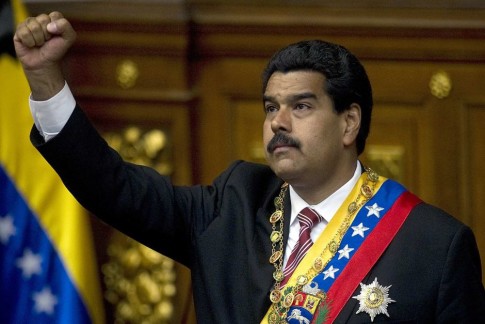
Nicolas Maduro, the hapless president of socialist Venezuela, here seen hung with all sorts of bling supposed to testify to his achievements.
Photo credit: Prensa Presidencial
Under the assumption that such a free market money system would be largely non-inflationary, this mixture of “historical record” and expectations would primarily be expressed by the relative prices of shares. The bulk of the returns achieved by investors would come from dividend payments, as a general inflation of “the market” would be nigh impossible.
And yet, although the stock market as a whole would barely appreciate in price in nominal terms, the gains achieved in real terms as well as real economic growth, would be far stronger than they are under our current, centrally planned system of constant inflation. Moreover, economic progress would be far more equitable as well, as the reverse redistribution of wealth caused by inflationary policy wouldn’t exist.
This is why a rising stock market tells us absolutely nothing about the state of the underlying economy in the present inflationary system. In fact, we once again have a real life example providing ample empirical confirmation of this assertion. Venezuela’s economy is in free-fall. Its desperate socialist government, in an attempt to satisfy the masses of voters who have voted for it in order to receive handouts, is resorting to ever more repressive economic policy and money printing on a truly gargantuan scale to at least keep up the appearance that bread and circuses will continue. It has long lost the last shred of credibility, as shortages of basic goods have become the major hallmark of the country’s economy.
However, amid capital controls and a collapse of Venezuela’s currency on the “black” market, the country’s stock market is soaring:
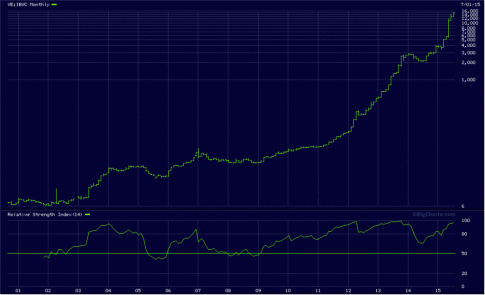
The IBC General Index in Caracas, monthly, log scale – click to enlarge.
Since the beginning of 2015, the Caracas stock market is up by more than 300% – note that this index was trading at a mere 6 points in 2002 and currently stands at nearly 15,000 points. This is what is indicative of a crack-up boom – as the currency system implodes, a flight into real assets is underway and titles to capital are soaring in value when measured in terms of the currency that is about to cease functioning as a medium of exchange. This is happening in spite of the fact that most of the businesses behind the stocks listed on the exchange are in fact consuming their capital and are no longer making any real profits.
A linear chart of the index shows the size of recent advance even more starkly:
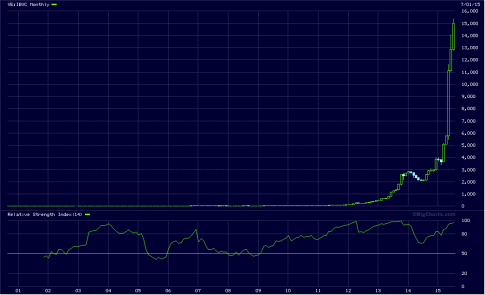
IBC General Index monthly, linear chart – click to enlarge.
Currency Collapse
With oil prices under great pressure, the government of Venezuela can no longer finance its socialist program. Having nationalized countless companies and replaced their managers with cronies of the ruling party, while restricting the remaining private sector in every imaginable way – de facto creating a full command economy that is a mixture of the Marxist and fascist economic models, i.e. a mixture of Marxist state-ownership of the means of production with a fascist Zwangswirtschaft (literally: “coerced economy”) for what remains of the market economy – there is no way for the government to obtain the revenue it needs to keep its socialist system funded.
Consequently, the only source of revenue for the government is the printing press of its central bank, which it is abusing quite liberally. There are several fixed exchange rates for the Venezuelan bolivar, which have long ceased to make even the faintest shred of sense. The reality is better reflected by black market exchange rates. Dolartoday.com keeps data on the black market in US dollars in the border town of Cucuta, which we are charting further below. In recent months, the bolivar has been in free-fall.
Headquarters of the Central Bank of Venezuela in Caracas
Photo credit: Caracasapie
The plunge in the currency’s external value has become relentless:
Black market rate of the Venezuelan bolivar against the US dollar in the border town of Cucuta. The collapse of the currency is accelerating – click to enlarge.
Venezuela’s official inflation data lack credibility, but even so they are giving an idea of how quickly the currency is depreciating internally as well. Below we show a chart of the official consumer price index from late 2007 to the end of 2014, based to 100 in December of 2007:
Venezuela’s official consumer price index between December 2007 (=100) to December 2014. More recent data are not available yet (it is probably no surprise that there is some foot-dragging with respect to these data releases). In December 2014, the official annualized inflation rate had accelerated to a new high of 68.5%. We imagine that even the official rate of change of CPI must by now be well over 100% – click to enlarge.
We don’t know what the actual rate of price inflation is at this time, but it seems likely that is is a multiple of the official rate. The recent increase in stock prices is in fact providing us with a good hint.
Conclusion
Venezuela’s hyperinflation is reaching its final stages. It is probably already far too late for the government to stop the complete collapse of its currency. The bolivar is in the process of transforming from a medium of exchange to tinder for wood-stoves. Venezuelans who had the presence of mind to convert their savings into gold or foreign currency in good time are likely to survive the conflagration intact.
Those who bought stocks on the Caracas stock exchange seem to have successfully side-stepped the effects of the devaluation as well, but they need a plan for the post-inflation adjustment crisis, which will bankrupt a great many companies very quickly. Also, the government can simply close the market down at any time if it doesn’t like what is happening there, so there is the ever-present danger of even more government interference as well.
It is quite fascinating to see that in spite of numerous examples throughout history, governments never seem to learn. They all believe they can somehow overrule economic laws by diktat. This is not only true of Venezuela’s government, but of practically every government in today’s world. Central planning of money has been adopted everywhere. Venezuela merely shows us what the end game for every fiat money system looks like.
At some point the State is overwhelmed by the promises it has made to its citizens. When it can no longer pay by means of confiscating private wealth, the printing press is always the last resort. Recently one actually gets the impression that it is often the first, rather than the last resort.
In developed countries, people believe that the planners have everything in hand, and that their “price stabilization” rules will protect them from such outcomes. However, it should be clear that these rules will simply be abandoned in extremis. The independence of central banks exists only on paper – it will mean nothing in a perceived “emergency”. It is almost comical in this context that gold is being sold while most of the world’s major central banks are seemingly hell-bent on aping John Law’s Banque Générale Privée.
Paper money endorsed by John Law – the grand-daddy of the hoary inflationism that has become the economic orthodoxy of modern times.
